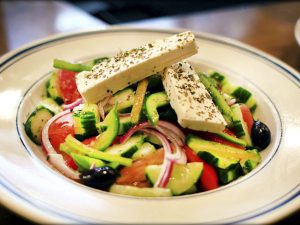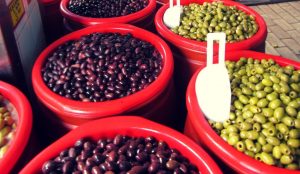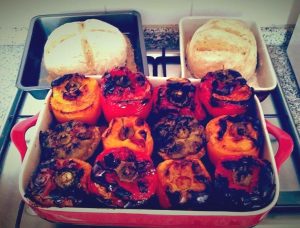Food in Greece – Everything you should know about Greek Food
It’s not Greek food without…
Olive oil and feta cheese! These are the two absolutely essential staples for any Greek person around the world – no, we are not exaggerating. We take Greek olive oil and Greek feta cheese extremely seriously, and we are not prepared to use substitutes. In fact, there are very few Greek dishes where olive oil is not used.

As for feta cheese, to our knowledge, it cannot be replaced with any other cheese. We have tried – and failed miserably!
Variety of dishes
Food in Greece is made from fresh ingredients when cooking, like vegetables, pulses, nuts, yogurt, cheese, grains, fish and small amounts of meat. It’s no secret that Greek cuisine is one of the healthiest in the world! A meal out, will typically include several small dishes (meze) which are shared with everyone, just like the bill.

Measuring system in Greek cooking
Most Greek cook books offer quantities when it comes to recipes. However, most Greek people, especially Yiayias (Grandmas) don’t really measure quantities when cooking. The best measuring system in Greece is “with the eye”. Therefore, the question “how many olives go in a Greek salad?” doesn’t really have an answer.

Similarly, if you ask for 300 gr of feta cheese at the supermarket, don’t be surprised if you end up with a half kilo packet. It’s assumed that it will be eaten!
Hours spent in a Greek kitchen
Many typical Greek dishes, like our famous moussaka, take hours to prepare. This is what makes Grandma’s food delicious! During important holidays, like Greek Easter, food preparations can go on for days – but time spent consuming that food can be equally long. After all,“He who receives his friends and gives no personal attention to the meal which is being prepared for them, is not worthy of having friends” (Jean-Anthelme Brillat-Savarin).

Some Greek food like home-made bread and stuffed tomatos and peppers take a long time to prepare, but they are totally worth it.
